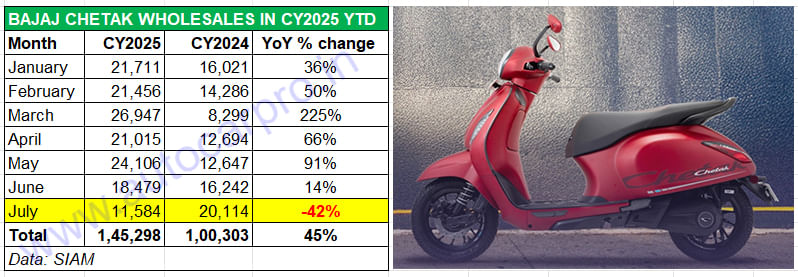Bajaj Auto, which was amongst the first Indian automakers to raise a red flag about the impending adverse impact of the shortage of supplies of rare earth magnets from China, has seen production of its Chetak electric scooter fall sharply by 47% year-on-year in July 2025.
As per the latest production data released by apex industry body SIAM, Bajaj Auto manufactured a total of 10,824 Chetaks last month – 9,560 fewer units than the 20,384 Chetaks produced in July 2024. On a month-on-month basis, July production is down 41% on June 2025’s 18,479 units, which itself was down 23% on the output in May 2025 (24,106 units).
 As a result of the hugely slowed-down factory output in July 2025, dispatches of the Bajaj Chetak electric scooter to dealers fell by 42% YoY to 11,584 units (July 2024: 20,114 units).
As a result of the hugely slowed-down factory output in July 2025, dispatches of the Bajaj Chetak electric scooter to dealers fell by 42% YoY to 11,584 units (July 2024: 20,114 units).

Rare earth magnets are used in a plethora of operations including electric vehicle motors, power steering systems, generator magnets, dashboard displays, and LED lighting systems, among other relevant components in the EV ecosystem.
As a result of the hugely slowed-down factory output last month, Bajaj Auto’s Chetak dispatches (wholesales) to its dealers have dropped by 42% YoY to 11,584 units (July 2024: 20,114 units). While this is the lowest in the current year to date, they come on the back of June 2025’s 18,479 units – the second lowest monthly dispatches this year for the company’s e-scooter.
If the ongoing crisis in the supply of rare earth magnets from China is not resolved, the company could witness a similar fall in production in August. “Our impairment of production started towards the end of June. In July, the production was affected to the extent of 50%. We were expecting the output to be zero in August, but it is not going to be so. August production will be better than July production, though we will still be at about 50-60% of the plan,” Bajaj Auto’s executive director Rakesh Sharma had said a month ago.
In an effort to mitigate the adverse impact of the massive shortage of heavy rare earth magnets, Bajaj Auto is working on two solutions – using light rare earth magnets which are more easily available and also developing new magnet technologies that negate the use of rare earth materials.
As compared to Bajaj Auto, production at its EV rivals TVS Motor Co, Ather Energy and Hero MotoCorp does not seem to have been as hugely impacted in July. TVS produced 23,742 iQubes last month, up 6% on year-ago output of 22,348 units. As per SIAM data, Ather Energy’s factories rolled out a total of 16,148 e-scooters, up 45% (July 2024: 11,097 units). And, Hero MotoCorp produced 11,314 Vida scooters, up 146% (July 2024: 4,592 units), with most of them being the recently launched Vida V2X which has received a very strong market response.
ALSO READ:
Electric 2W sales in India cross 700,000 in first seven months of 2025
